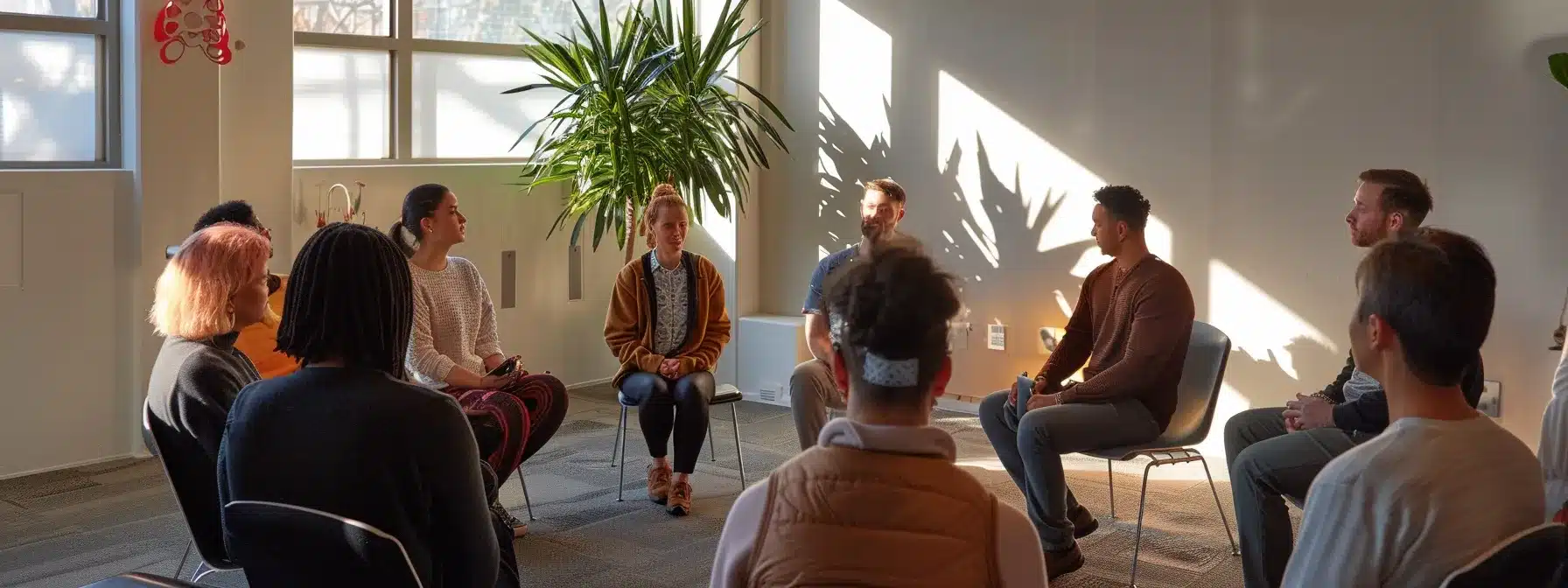Comprehensive Guide to LGBTQ+ Couples Counseling in Washington DC
Navigating Love: Your Complete Resource for LGBTQ+ Couples Therapy in DC
LGBTQ+ couples face unique challenges in their relationships, often requiring specialized support. This guide explores the importance of LGBTQ+ couples counseling in DC, addressing common issues and highlighting the benefits of therapy. We’ll discuss how to find the right therapist and what to expect from sessions, focusing on our practice, the Therapy Group of DC, a leading LGBTQ-affirming practice. By understanding these key aspects, couples in the LGBTQ+ community can take proactive steps toward strengthening their relationships and improving their mental health.
Key Takeaways
- LGBTQ+ couples therapy addresses unique challenges like societal pressures, discrimination, and internalized prejudices
- Effective communication and emotional connection are crucial for healthy LGBTQ+ relationships
- Therapists help couples navigate issues such as family acceptance, coming out, and gender identity
- The Therapy Group of DC offers specialized LGBTQ+ couples counseling with evidence-based techniques
- Couples therapy can help rebuild trust, resolve conflicts, and prepare for long-term commitments in LGBTQ+ relationships
Understanding the Importance of LGBTQ+ Couples Counseling
LGBTQ+ couples counseling addresses unique challenges in relationships, including societal pressures and discrimination. Mental health professionals use evidence-based psychotherapy to help couples build healthy communication patterns, overcome internalized prejudices, and foster emotional connection. This specialized counseling also supports individuals dealing with addiction and substance abuse issues, offering compassionate guidance to strengthen partnerships.
Addressing Unique Challenges in LGBTQ+ Relationships
LGBTQ+ relationships face unique challenges that require specialized attention in couples therapy. A psychologist or mental health counselor trained in LGBTQ+ issues provides a safe space for partners to explore their concerns openly. These challenges often stem from societal pressures, discrimination, and internalized prejudices that can affect the relationship dynamics.
Couples therapy for the LGBT community addresses these specific issues while focusing on improving communication and strengthening emotional bonds. Therapists help partners navigate complex topics such as coming out, family acceptance, and gender identity, which may not be as prevalent in heterosexual relationships. By addressing these unique challenges, LGBTQ+ couples can build more resilient and fulfilling partnerships.
- Creating a safe space for open dialogue
- Addressing societal pressures and discrimination
- Improving communication between partners
- Navigating complex LGBTQ+ specific issues
- Building resilience in relationships
Navigating Societal Pressures and Discrimination
LGBTQ+ couples in DC often face unique societal pressures and discrimination that can strain their intimate relationships. These challenges may include workplace discrimination, family rejection, and legal barriers to health insurance coverage. Mental health professionals specializing in gay and lesbian couples therapy in DC help partners navigate these external stressors while maintaining a strong bond.
Counseling sessions address the impact of societal attitudes towards homosexuality, bisexuality, and minority gender identity status on individual and relationship well-being. Therapists work with couples to develop coping strategies for dealing with discrimination, build resilience, and foster a supportive network. This approach helps LGBTQ+ couples maintain healthy relationships despite external pressures, ultimately improving their overall mental health and quality of life.
Building Healthy Communication Patterns
Effective communication forms the cornerstone of healthy relationships, particularly for LGBTQ+ couples facing unique challenges. Therapists specializing in transgender, gay, and lesbian couples counseling help partners develop open, honest, and respectful communication patterns. These skills prove essential when discussing sensitive topics related to gender identity, sexual orientation, and emotional needs.
LGBTQ+ couples often grapple with anxiety and psychological trauma stemming from societal pressures or past experiences. Couples learn to express their feelings, fears, and desires through guided communication exercises in a safe environment. This process fosters mutual understanding and empathy, strengthening the emotional bond between partners and reducing relationship stress.
Overcoming Internalized Prejudices
Internalized prejudices can significantly impact LGBTQ+ relationships, often stemming from societal and familial experiences. LGBTQ+ couples counseling addresses these deep-seated biases by helping individuals recognize and challenge negative self-perceptions related to their sexual orientation or gender identity. Through family therapy techniques, couples learn to navigate complex gender roles and expectations, reducing stress within their relationship.
Therapists specializing in LGBTQ+ issues guide couples in exploring how internalized prejudices affect their dynamics, including attitudes towards polyamory or non-traditional relationship structures. By confronting these biases in a supportive environment, partners can develop a stronger sense of self-acceptance and mutual understanding. This process often leads to improved communication and a more authentic expression of love and commitment within the relationship.
Fostering Emotional Connection and Trust
LGBTQ+ couples counseling prioritizes fostering emotional connection and trust, essential components for healthy relationships. Therapists help partners explore their identities, including sexual orientation and gender identity, within the context of their family dynamics. This process allows couples to build a deeper understanding of each other’s experiences and emotions, creating a foundation for stronger intimacy.
Counselors guide couples through exercises that address grief, trauma, and other emotional challenges specific to LGBTQ+ relationships. By providing a safe space to process these feelings, partners learn to support each other through difficult times, strengthening their emotional bond. This approach helps couples develop resilience and a shared sense of identity, crucial for navigating the unique pressures they may face:
- Exploring individual and shared identities
- Processing grief and trauma together
- Developing emotional support strategies
- Building resilience as a couple
- Strengthening intimacy through shared experiences
Common Relationship Issues Faced by LGBTQ+ Couples
LGBTQ+ couples in Washington DC face unique challenges that can impact their relationships. Licensed professional counselors address issues such as family acceptance, coming out experiences, minority stress, gender identity conflicts, and balancing individual identities within partnerships. These concerns often intersect with mental health, discrimination, and shame, requiring specialized therapeutic approaches to foster healthy, resilient relationships.
Dealing With Family Acceptance and Support
Family acceptance plays a crucial role in the emotional intimacy of LGBTQ+ couples. Therapists often focus on building a strong therapeutic relationship to help partners navigate the complex dynamics of parental support. By addressing these issues, couples can develop strategies to maintain healthy boundaries while fostering understanding with their families.
Counselors may draw on the research of John Gottman to guide couples through discussions about family acceptance and its impact on their relationship. This approach can be particularly helpful for those in open relationships, as it provides a framework for addressing unique family challenges. Through therapy, couples learn to support each other emotionally while navigating varying levels of family acceptance.
Managing Different Coming Out Experiences
LGBTQ+ couples often face challenges when partners have different coming out experiences. Counseling psychology professionals help couples navigate these disparities by fostering empathy and understanding. Therapists guide partners in exploring how their individual coming out journeys have shaped their behaviors and fears within the relationship.
Addressing divergent coming out experiences may involve examining the impact of alcohol use as a coping mechanism. Mental health professionals assist couples in developing healthier strategies to manage stress and anxiety related to disclosure. This process aims to strengthen the relationship by promoting open communication and mutual support:
- Exploring individual coming out journeys
- Identifying behavioral patterns influenced by disclosure experiences
- Developing coping strategies that don’t rely on substance use
- Fostering empathy for each partner’s unique challenges
- Building a supportive environment for ongoing identity exploration
Coping With Minority Stress and Mental Health
LGBTQ+ couples in DC often face minority stress, which requires special attention in therapy sessions. Mental health professionals create a safe space for partners to discuss their experiences with discrimination and societal pressures. By fostering understanding between partners, therapists help couples develop coping strategies to manage the unique stressors they encounter.
Counselors address the impact of minority stress on individual and relationship well-being, including issues related to surrogacy and family planning. They guide couples in recognizing signs of internalized stigma and provide tools for building resilience. This approach helps partners support each other effectively, strengthening their bond while navigating the challenges specific to LGBTQ+ relationships.
Handling Conflicts Over Gender Roles and Expectations
LGBTQ+ couples in Washington DC often grapple with conflicts arising from gender roles and expectations within their relationships. Mental health professionals specializing in gay men’s issues help partners navigate these challenges by exploring each individual’s sexual identity and how it influences their expectations. Through cognitive behavioral therapy techniques, couples learn to recognize and challenge societal norms that may not align with their unique partnership dynamics.
Social work professionals assist LGBTQ+ couples in developing a shared understanding of roles within their relationship, emphasizing the importance of open communication and mutual respect. Therapists guide partners in creating a balance between maintaining individual identities and fostering a strong sense of friendship and intimacy. This approach helps couples establish equitable responsibilities and expectations, leading to more harmonious and fulfilling relationships.
Balancing Individual Identity With Partnership
LGBTQ+ couples in DC often struggle to balance their individual identities within their partnerships. Mental health professionals use emotionally focused therapy techniques to help partners navigate the complexities of maintaining personal autonomy while fostering a strong relationship. This approach addresses internalized prejudice and promotes insight into how individual experiences shape the couple’s dynamic.
Though not often popular with couples, online counseling services provide a convenient platform for LGBTQ+ couples, especially those in more rural areas, to explore issues related to identity and partnership. Therapists guide discussions on topics such as monogamy expectations, cultural differences, and career aspirations, helping partners find common ground while respecting individual needs. This process enables couples to build a relationship that honors both shared values and personal growth:
- Exploring individual and shared identities
- Addressing internalized prejudice
- Discussing monogamy expectations
- Navigating cultural differences
- Balancing personal and professional aspirations
Finding the Right LGBTQ+ Couples Therapist in DC
Finding an LGBTQ+ couples therapist in Washington DC requires careful consideration. This section explores the qualities of inclusive counselors, questions to ask prospective therapists, and local therapy options. It also addresses assessing a therapist’s experience with LGBTQ+ issues and utilizing community resources. Considerations include the therapist’s background in social work, understanding of masculinity, and approach to marriage counseling and psychiatry.
Qualities of an Inclusive and Affirming Counselor
An inclusive and affirming couples counselor for LGBTQ+ individuals in DC demonstrates a deep understanding of the unique challenges faced by same-sex partnerships. These therapists possess specialized training in gay couples counseling and maintain an open, non-judgmental approach to diverse relationship structures. Effective counselors create a safe space where partners feel comfortable exploring their identities and relationship dynamics without fear of discrimination.
LGBTQ+ couples seeking therapy benefit from counselors who actively engage in ongoing education about gender identity, sexual orientation, and the evolving landscape of LGBTQ+ rights. These therapists utilize evidence-based techniques tailored to address the specific needs of same-sex couples, such as navigating societal pressures or family acceptance issues. By combining clinical expertise with cultural competency, affirming counselors provide invaluable support to LGBTQ+ couples striving for healthier, more fulfilling relationships.
Questions to Ask Prospective Therapists
When seeking relationship counseling, LGBTQ+ couples should inquire about a therapist’s experience with gay couples therapy. Prospective clients can ask about the counselor’s approach to LGBTQ-specific issues, such as navigating family dynamics or addressing internalized homophobia. This information helps ensure the couples therapist possesses the necessary expertise to provide effective support.
Couples may also benefit from asking about a therapist’s familiarity with local LGBTQ+ resources and community support networks in DC. Understanding a counselor’s connection to these resources can indicate their commitment to comprehensive care for LGBTQ+ clients. Additionally, inquiring about the therapist’s methods for creating an inclusive environment during counseling sessions can help couples feel more comfortable and open during therapy.
Exploring Therapy Options Available Near You
Washington, DC offers numerous options for LGBTQ+ couples seeking relationship counseling. Couples can explore specialized services at LGBTQ-focused mental health centers, private practices with gay relationship therapists, and community organizations providing LGBT relationship counseling. These diverse options ensure that couples can find a therapist who aligns with their specific needs and preferences.
When searching for marriage counseling LGBT services, couples should consider factors such as location, cost, and therapist expertise. Many practices in DC offer couples counseling LGBTQ services with flexible scheduling options, including evening and weekend appointments. Some therapists also provide teletherapy sessions, making it convenient for couples to access support from the comfort of their homes. To find the best fit, couples can utilize online directories, ask for recommendations from LGBTQ+ community centers, or consult with their primary care providers:
- LGBTQ-focused mental health centers
- Private practices with gay relationship therapists
- Community organizations offering LGBT relationship counseling
- Teletherapy options for remote sessions
- Online directories and community recommendations
Assessing a Therapist’s Experience With LGBTQ+ Issues
When assessing a therapist’s experience with LGBTQ+ issues, couples should inquire about their specific training in relationship therapy for diverse sexual orientations and gender identities. A qualified therapist should demonstrate knowledge of cisgender and transgender experiences, as well as understanding how body image concerns may impact LGBTQ+ relationships. Couples counseling services that specialize in LGBTQ+ issues often employ therapists with additional certifications or doctoral degrees in psychology, masters or doctorates in counseling, or LMSW (Licensed Master Social Worker) degree focused on this population.
Therapists experienced in LGBTQ+ couples counseling should be able to discuss their approach to addressing unique challenges faced by same-sex couples, such as navigating societal pressures or family acceptance issues. They should also be familiar with local LGBTQ+ resources and support networks in Washington DC. Couples can ask potential therapists about their experience working with clients who share similar backgrounds or relationship structures to ensure a good fit for their specific needs.
Utilizing Local LGBTQ+ Resources and Referrals
Washington DC offers a wealth of LGBTQ+ resources and referrals to help couples find suitable mental health professionals for lgbtq couples therapy. Organizations like the DC Center for the LGBT Community and Whitman-Walker Health provide comprehensive directories of mental health professionals and therapists specializing in LGBT therapy. These resources often include detailed profiles of therapists, allowing couples to make informed decisions based on expertise and specialization.
Many local LGBTQ+ support groups and community centers in DC also offer referrals to qualified therapists who provide online therapy options. Mental health professionals listed through these channels typically have extensive experience working with LGBTQ+ couples, ensuring culturally competent care. Couples can utilize these resources to connect with therapists who understand their unique needs and challenges:
- LGBTQ+ community centers with therapist directories
- Support groups offering professional referrals
- Online platforms connecting couples with specialized therapists
- Local LGBTQ+ health clinics with mental health services
- Professional associations providing lists of LGBT-affirming therapists
What to Expect From LGBTQ+ Couples Therapy Sessions
LGBTQ+ couples therapy sessions in Washington DC offer a structured approach to addressing relationship challenges. Therapists guide partners in setting goals, creating a safe space, and utilizing effective therapeutic techniques. Sessions focus on managing issues like anger and jealousy while considering cultural factors. Couples learn to integrate therapy insights into daily life and track progress, fostering a deeper understanding of their relationship dynamics.
Setting Goals and Intentions Together
LGBTQ+ couples in Washington DC begin therapy by collaboratively setting goals and intentions with their therapist. This process involves each partner expressing their individual perceptions of the relationship and desired outcomes. By aligning their romantic aspirations with therapeutic objectives, couples establish a foundation for meaningful progress in their sessions.
Therapists guide patients through goal-setting exercises, drawing on psychological principles to foster confidence in the therapy process. These goals often address specific challenges unique to LGBTQ+ relationships, such as navigating societal pressures or family dynamics. The collaborative approach ensures both partners feel heard and invested in their therapeutic journey:
- Identifying individual and shared relationship goals
- Aligning romantic aspirations with therapeutic objectives
- Addressing LGBTQ+-specific relationship challenges
- Building confidence in the therapy process
- Establishing a foundation for meaningful progress
Creating a Safe and Confidential Space
LGBTQ+ couples therapy in DC prioritizes creating a safe and confidential space for partners to explore their relationship dynamics. Therapists specializing in marriage therapy and individual counseling for LGBTQ+ individuals establish clear boundaries and confidentiality protocols at the outset of therapy. This approach ensures that couples feel secure discussing sensitive topics related to their sexual orientation, gender identity, and relationship challenges.
Counseling couples in a safe environment allows for open and honest communication about issues unique to LGBTQ+ relationships. Therapy couples benefit from an atmosphere free from judgment, where they can explore their feelings and experiences without fear of discrimination. LGBTQ+ therapy sessions often incorporate specific techniques to address internalized stigma and promote self-acceptance, further enhancing the therapeutic space:
- Establishing clear confidentiality protocols
- Creating a judgment-free environment
- Addressing LGBTQ+-specific relationship issues
- Promoting self-acceptance and reducing internalized stigma
- Facilitating open and honest communication between partners
Therapeutic Approaches Used in Counseling
LGBTQ+ therapists in Washington DC employ various therapeutic approaches tailored to the unique needs of same-sex couples. Professional counselors often utilize evidence-based methods such as Emotionally Focused Therapy (EFT) and Cognitive Behavioral Therapy (CBT) to address relationship dynamics. These approaches help couples identify and modify negative thought patterns and behaviors, fostering stronger emotional connections. For more in-depth exploration, you might find the discussion on the mental and emotional health needs of LGBTQ individuals insightful.
Individual therapy sessions may complement couples counseling, allowing partners to explore personal issues that impact the relationship. Many practices offer convenient client portals for scheduling and accessing resources. Therapists also address specific concerns like adoption processes for LGBTQ+ couples, providing comprehensive support throughout their journey. The following therapeutic approaches are commonly used in LGBTQ+ couples counseling:
- Emotionally Focused Therapy (EFT)
- Cognitive Behavioral Therapy (CBT)
- Narrative Therapy
- Gottman Method Couples Therapy
- Mindfulness-Based Stress Reduction (MBSR)
Integrating Therapy Insights Into Daily Life
LGBTQ+ couples in Washington DC learn to integrate therapy insights into their daily lives, focusing on improving overall happiness and relationship satisfaction. Psychologists guide partners in applying communication techniques and coping strategies learned during sessions to address everyday challenges. This process often involves navigating complex issues such as gender dysphoria or supporting a partner through gender transition, requiring ongoing practice and commitment.
Therapists help couples develop personalized strategies for implementing therapeutic insights, which may include addressing kink-related concerns or managing stress associated with gender identity. By consistently applying these tools, partners can create a more supportive and understanding environment at home. The integration process typically involves the following steps:
- Identifying key insights from therapy sessions
- Setting realistic goals for implementing changes
- Practicing new communication techniques daily
- Regularly checking in with each other about progress
- Seeking additional support when facing challenging situations
Tracking Progress and Celebrating Achievements
LGBTQ+ couples in Washington DC benefit from tracking progress and celebrating achievements during their therapy journey. Clinicians help partners set measurable goals related to communication, intimacy, and desire, allowing them to recognize improvements over time. This process often includes addressing sensitive topics such as sexual abuse or injury, with therapists guiding couples through healing and growth. For those interested in finding a specialized therapist in this area, gay therapist Washington DC might be a helpful resource.
Sex therapy for LGBTQ+ couples incorporates regular check-ins to assess progress and adjust treatment plans as needed. Therapists encourage partners to acknowledge small victories, fostering a sense of accomplishment and motivation. By celebrating these achievements, couples build resilience and strengthen their bond, creating a foundation for long-term relationship success.
Benefits of Queer Couples Therapy in Strengthening Relationships
Queer couples therapy offers numerous benefits for strengthening LGBTQ+ relationships in Washington DC. This section explores how therapy enhances communication, resolves conflicts, rebuilds trust, and addresses unique challenges like open relationships. It also examines the role of therapy in preparing couples for long-term commitments, emphasizing skills for navigating intersectionality and overcoming bias. These insights provide valuable tools for couples seeking to deepen their connection and avoid divorce.
Enhancing Communication and Understanding
Queer couples therapy in Washington DC enhances communication and understanding by addressing the unique challenges LGBTQ+ partners face, including minority stress and family planning concerns. Therapists help couples develop effective strategies to express their feelings and needs, fostering a deeper connection. This improved communication often leads to reduced conflict and increased empathy, particularly when navigating complex issues specific to LGBTQ+ relationships.
Through telehealth options, couples in Virginia and surrounding areas can access specialized counseling services that focus on their unique experiences. These sessions provide a safe space for partners to explore their identities, discuss societal pressures, and develop coping mechanisms for dealing with discrimination. By addressing these factors, couples can build a stronger foundation for their relationship, leading to improved overall satisfaction and resilience.
Resolving Conflicts Constructively
LGBTQ+ couples therapy in DC equips partners with effective conflict resolution strategies, addressing issues such as anger management and communication breakdowns. Therapists guide couples through constructive dialogue techniques, helping them express emotions like anger or pain without damaging their relationship. This approach is particularly beneficial for couples navigating complex issues such as differences in libido or challenges related to coming out.
Through therapy, partners learn to identify underlying causes of conflicts and develop empathy for each other’s experiences. This process often involves exploring how societal pressures or internalized stigma impact their interactions. By fostering a deeper understanding of each other’s perspectives, couples can work together to find solutions that strengthen their bond and reinforce their love for one another.
Rebuilding Trust and Intimacy
LGBTQ+ couples therapy in Washington DC focuses on rebuilding trust and intimacy, addressing issues such as transphobia and neurodiversity that may impact relationships. Therapists draw from research to guide couples through exercises that foster emotional connection and physical intimacy. This process often involves exploring how past experiences, including discrimination or trauma, affect current relationship dynamics.
Couples learn strategies to overcome barriers to intimacy, which may include addressing health insurance coverage for gender-affirming care or navigating long-distance relationships across states like New Jersey. Therapists help partners develop a deeper understanding of each other’s needs and boundaries, creating a foundation for renewed trust and closeness. The therapy process typically involves:
- Identifying trust barriers and intimacy challenges
- Exploring the impact of transphobia and neurodiversity on relationships
- Developing strategies for emotional and physical reconnection
- Addressing practical concerns like health insurance coverage
- Creating a safe space for vulnerability and healing
Navigating Open Relationships and Polyamory
LGBTQ+ couples in DC seeking to navigate open relationships or polyamory can benefit significantly from specialized counseling. Therapists help partners establish clear boundaries and communication protocols, addressing concerns related to trust and potential feelings of oppression within non-traditional relationship structures. By providing education on ethical non-monogamy, counselors support couples in challenging societal norms and fostering a sense of social justice within their relationships.
Couples therapy for those exploring open relationships often involves developing strategies to manage jealousy, insecurity, and the impact of internalized stigma. Therapists guide partners through exercises that build trust and reinforce their commitment to each other, even as they expand their relationship boundaries. This process helps couples avoid the pitfalls of conversion therapy by affirming their choices and providing tools to navigate the complexities of polyamorous relationships in a heteronormative society.
Preparing for Marriage and Long-Term Commitment
LGBTQ+ couples in Washington DC benefit from premarital counseling that addresses unique challenges in preparing for long-term commitment. Therapists help partners navigate issues such as perfectionism and stress management, which can significantly impact relationship dynamics. By focusing on these areas, couples develop strategies to maintain a healthy mood and lifestyle balance as they transition into marriage.
Counseling sessions often explore how societal expectations and personal aspirations affect the couple’s vision for their future together. Therapists guide partners in creating a shared understanding of their goals, addressing concerns about family planning, career management, and financial stability. This process helps couples build a strong foundation for their marriage, ensuring they are well-equipped to handle the complexities of long-term commitment in the LGBTQ+ community:
- Addressing perfectionism and its impact on relationships
- Developing effective stress management techniques
- Creating a shared vision for the future
- Exploring family planning options for LGBTQ+ couples
- Balancing individual career goals with relationship commitments
Leading LGBTQ Practice: Therapy Group of DC
The Therapy Group of DC is a leading LGBTQ+ practice in Washington, offering specialized couples counseling. With a long-standing commitment to LGBTQ mental health, the group provides accessible, expert care addressing unique challenges like assault trauma and relationship issues. Their approach integrates evidence-based techniques, drawing on specialist experience to support healthy partnerships and individual well-being.
Our Long-Standing Commitment to LGBTQ Mental Health and Healthy Relationships
The Therapy Group of DC has demonstrated a long-standing commitment to LGBTQ mental health and healthy relationships, offering specialized services that address unique challenges faced by the community. Their approach incorporates evidence-based techniques to support individuals on the autism spectrum and those dealing with suicidal ideation, ensuring comprehensive care for diverse needs.
With a focus on fostering creativity and promoting sexual consent education, the practice has established itself as a trusted resource for LGBTQ+ couples in the District, Maryland, Virginia and beyond. The group’s dedication to addressing complex issues within same-sex relationships has contributed to improved mental health outcomes and stronger partnerships among their clients.
Our Approach to Couples Therapy
The Therapy Group of DC employs a comprehensive approach to couples therapy, addressing complex issues such as betrayal and loneliness within LGBTQ+ relationships. Our skilled therapists conduct thorough psychological evaluations to identify underlying concerns and tailor treatment plans to each couple’s unique needs, ensuring a holistic understanding of relationship dynamics.
Recognizing the diverse needs of LGBTQ+ clients, we integrate various therapeutic modalities, with a focus on Emotionally Focused Therapy (EFT) for couples. EFT helps partners identify and transform negative interaction patterns, fostering secure emotional bonds and enhancing intimacy. This evidence-based approach is particularly effective in addressing trust issues and improving communication.
To complement traditional talk therapy, we occasionally incorporate elements of play therapy techniques. These experiential activities can help couples explore intimacy issues, enhance emotional expression, and rediscover joy in their relationships in a safe, creative environment.
Our practice also provides support for partners undergoing hormone replacement therapy, offering guidance on navigating physical and emotional changes within the relationship context. This specialized support ensures that couples can maintain strong connections throughout significant life transitions.
By combining these diverse therapeutic approaches, we help couples build resilience, deepen their emotional connection, and develop the tools necessary for long-lasting, fulfilling relationships.
Specialist Experience
The Therapy Group of DC boasts specialist experience in addressing sexual dysfunction within LGBTQ+ relationships. Their therapists possess extensive training in navigating the complexities of intimacy issues specific to same-sex couples, offering tailored interventions that promote healthy sexual expression and satisfaction.
Drawing from evidence-based practices, the group’s specialists provide comprehensive support for couples experiencing sexual challenges. They address concerns such as mismatched libidos, erectile dysfunction, and the impact of gender-affirming treatments on sexual function, ensuring a holistic approach to sexual health within LGBTQ+ partnerships. This specialized expertise enables couples to overcome barriers to intimacy and foster stronger connections:
- Tailored interventions for same-sex intimacy issues
- Support for mismatched libidos and erectile dysfunction
- Guidance on sexual health during gender-affirming treatments
- Evidence-based practices for overcoming intimacy barriers
- Holistic approach to sexual satisfaction in LGBTQ+ relationships
Conclusion
LGBTQ+ couples counseling in Washington DC provides essential support for navigating unique relationship challenges, addressing societal pressures, and fostering healthy communication. The Therapy Group of DC stands out as a leading practice, offering specialized care that integrates evidence-based techniques and draws on extensive experience with LGBTQ+ issues. Our psychologists, counselors, and therapists help couples build trust, resolve conflicts, and strengthen their emotional bonds by creating safe spaces for open dialogue and utilizing tailored therapeutic approaches. This comprehensive guide underscores the importance of accessible, affirming mental health care for LGBTQ+ couples, highlighting the transformative power of therapy in cultivating resilient, fulfilling relationships.
Reaching Out
Taking the first step towards couples therapy can be both exciting and nerve-wracking. We encourage you to reach out to us with any questions or concerns you may have about the process. Our compassionate team is here to guide you through the initial stages, from scheduling your first appointment to understanding what to expect in your sessions. Remember, seeking support is a sign of strength and commitment to your relationship. Don’t hesitate to contact us today to begin your journey towards a stronger, more fulfilling partnership.





